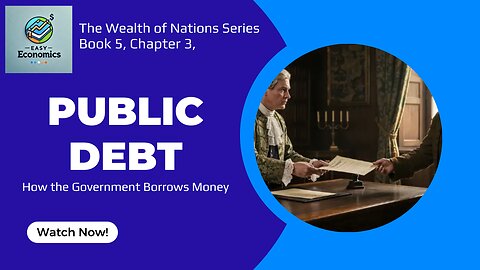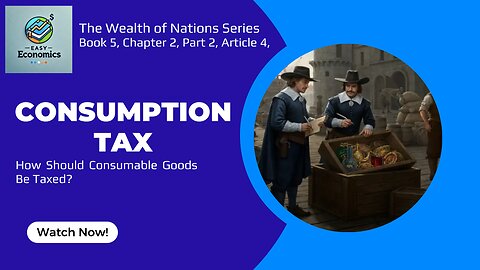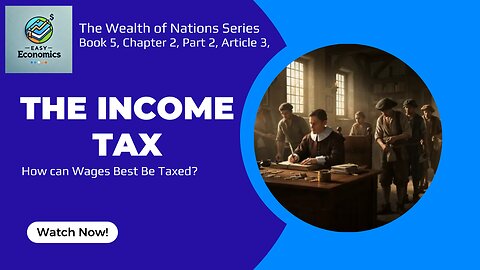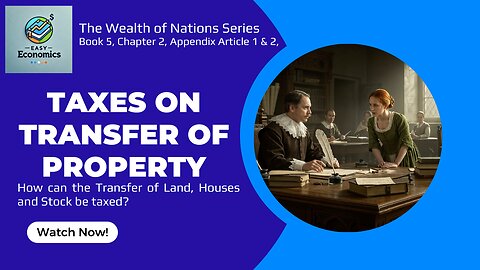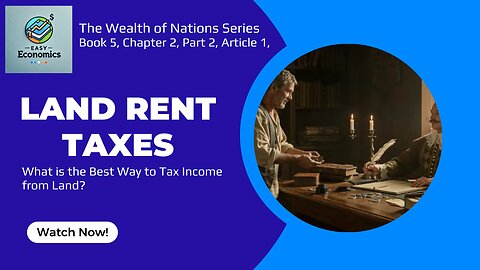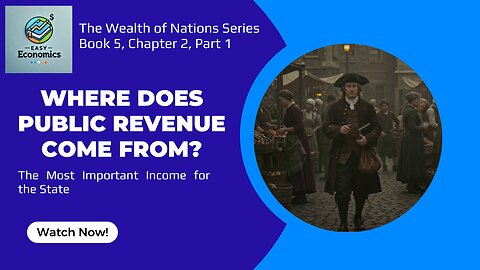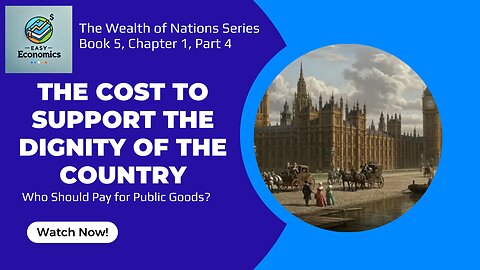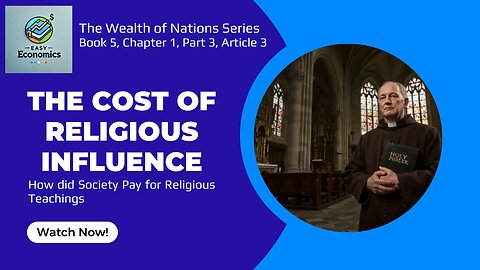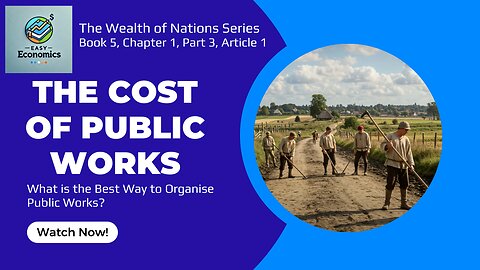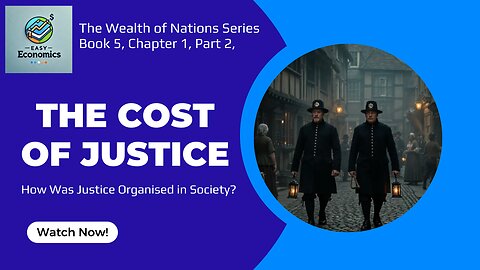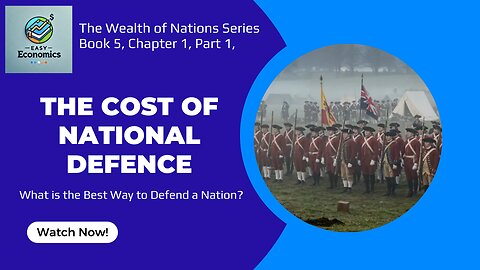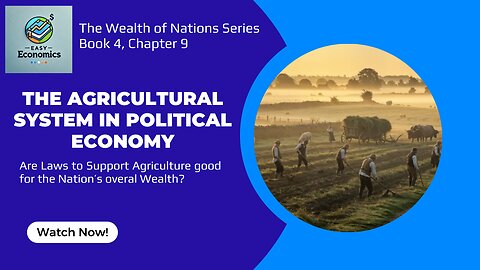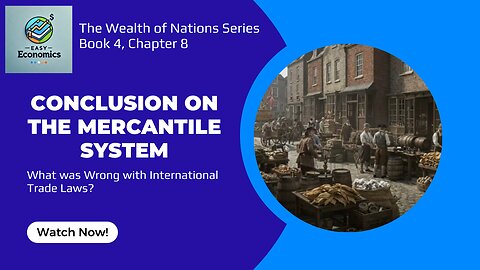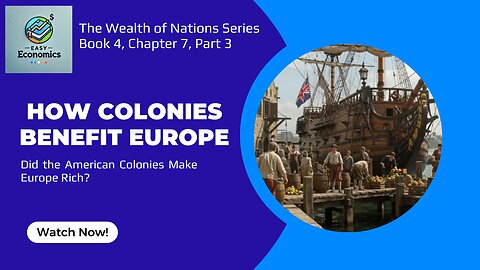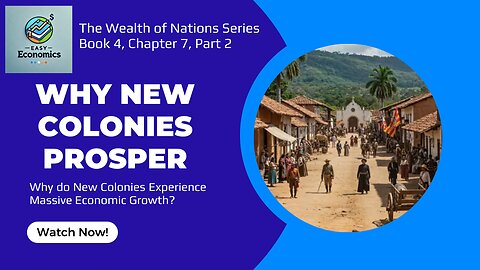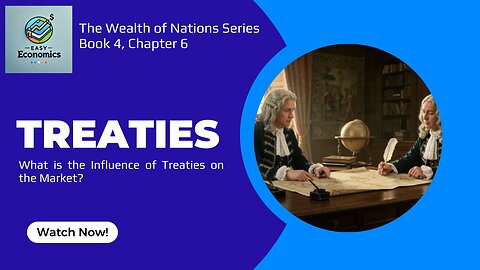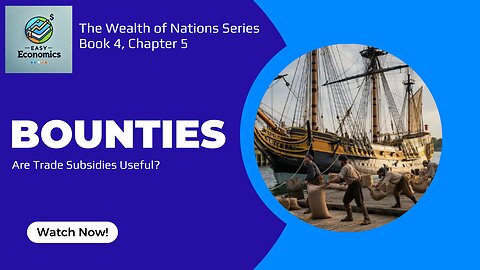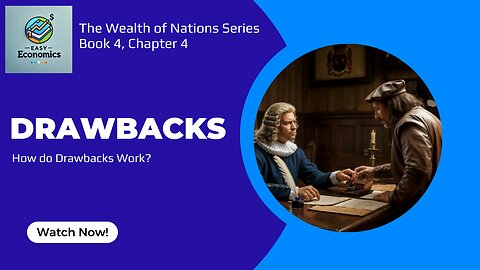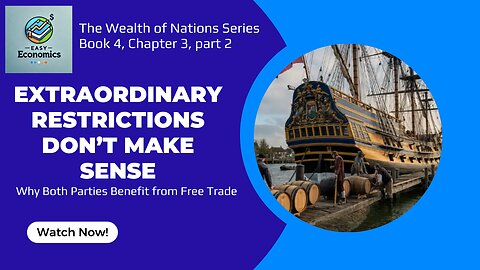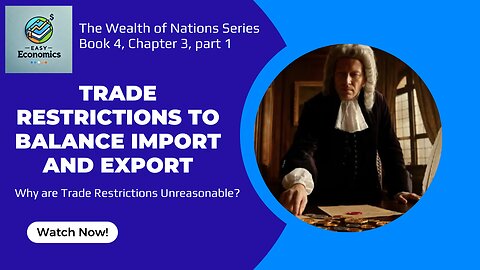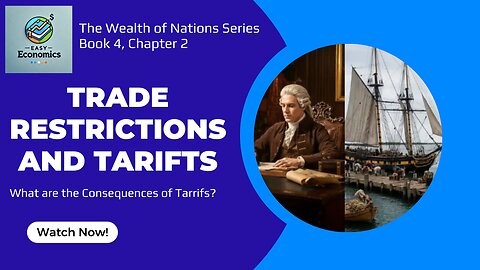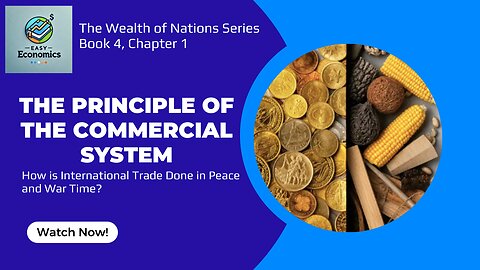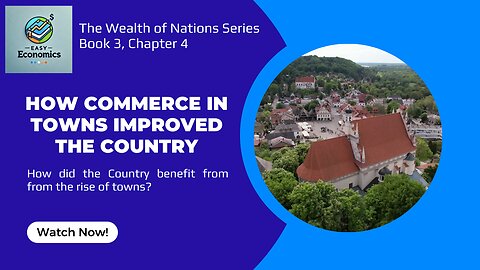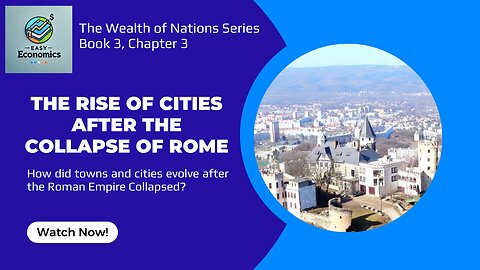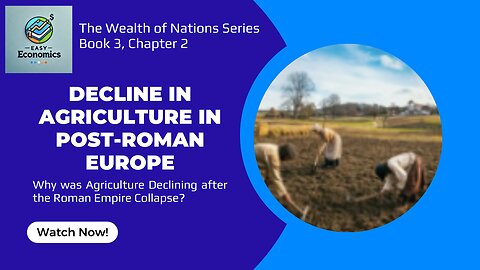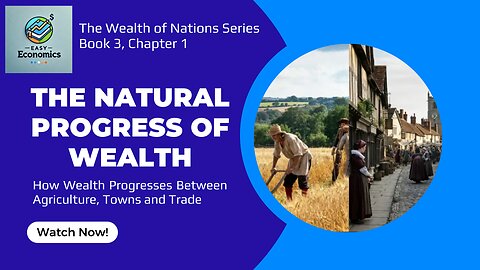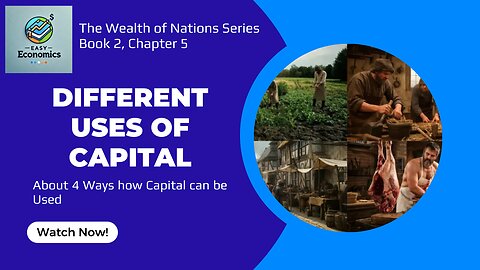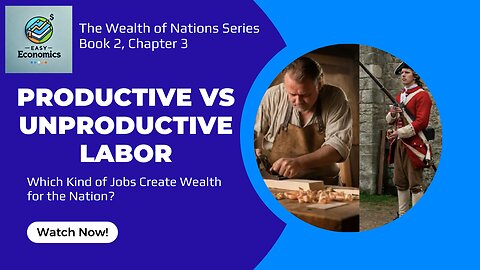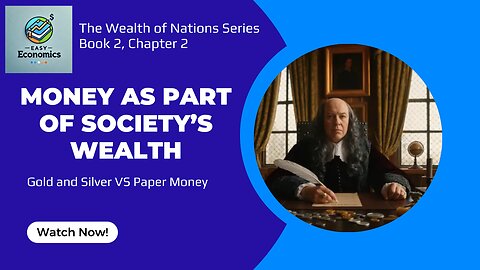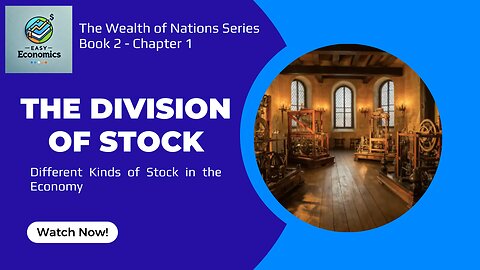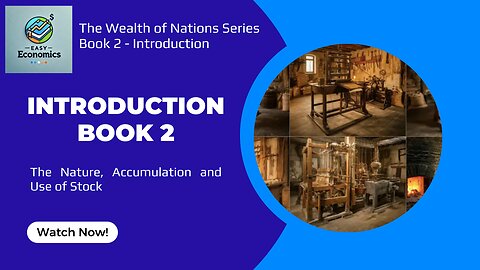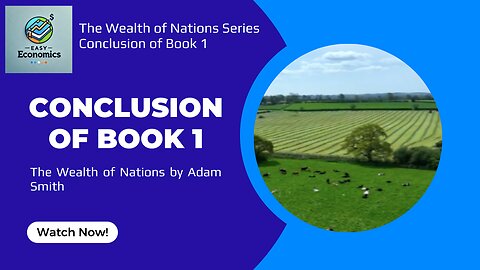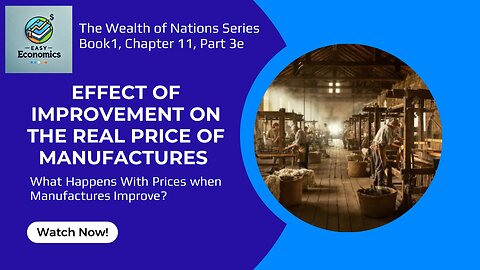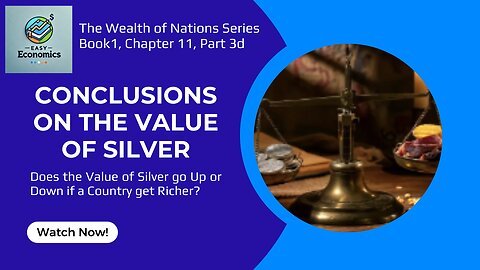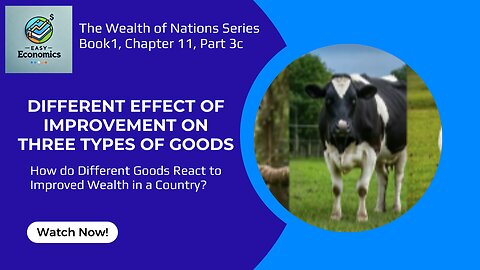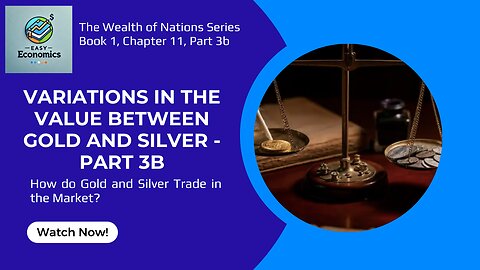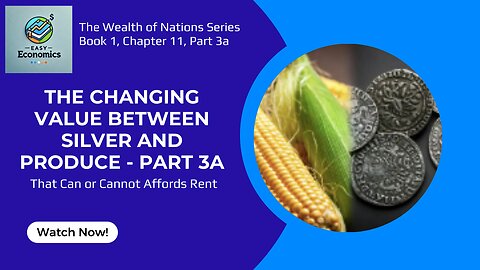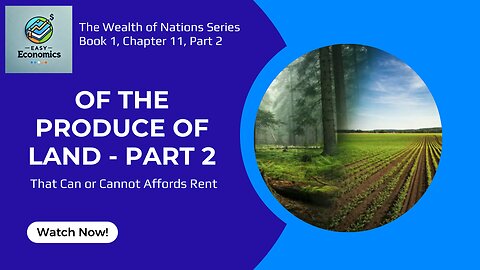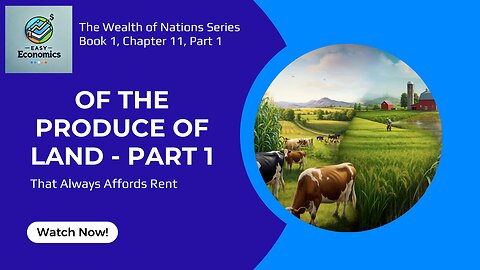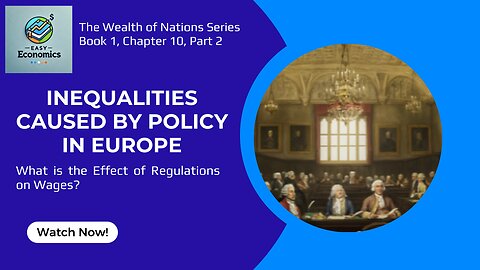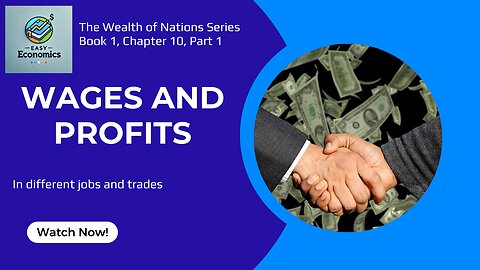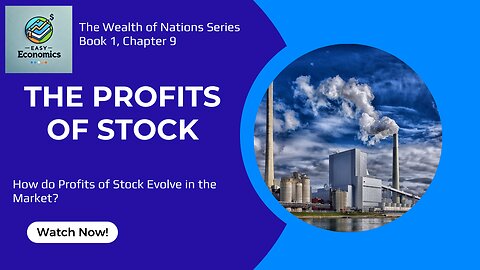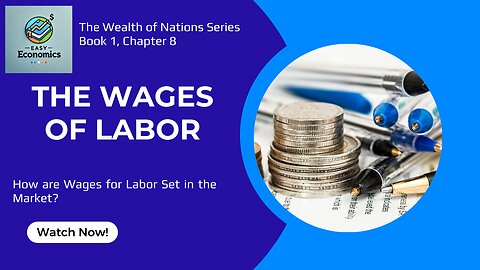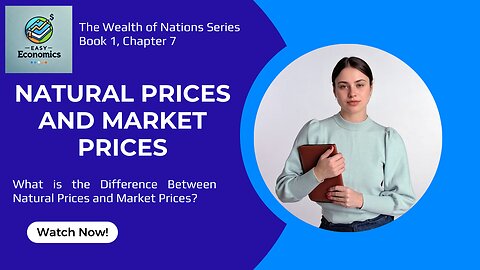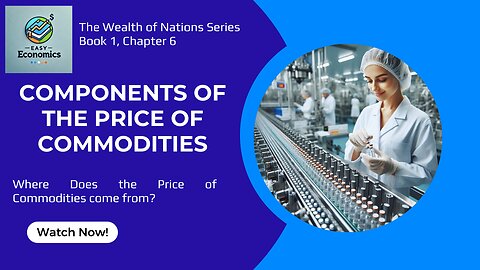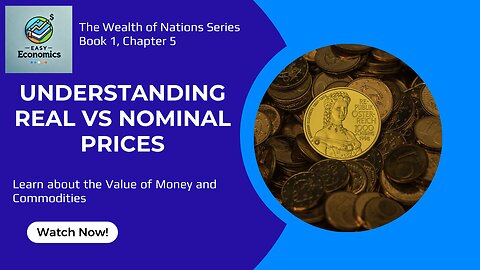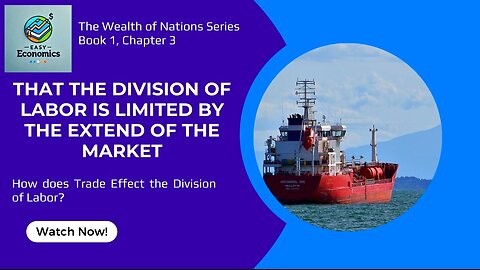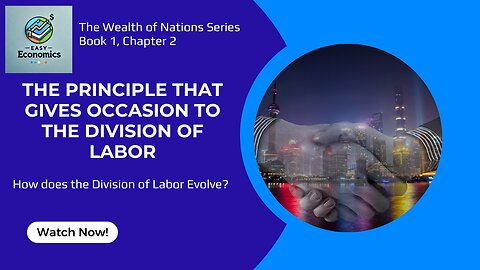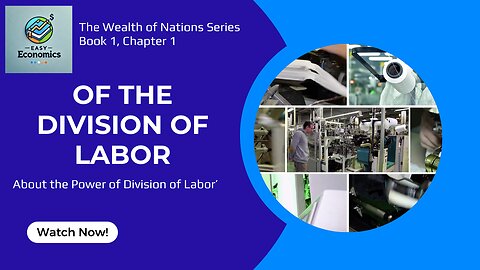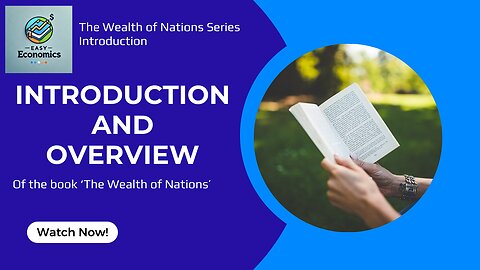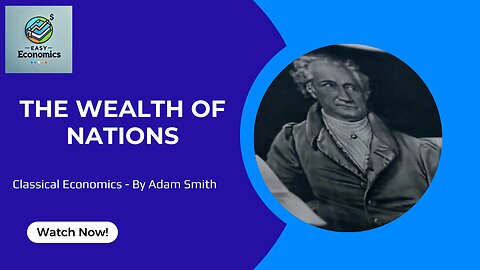Premium Only Content
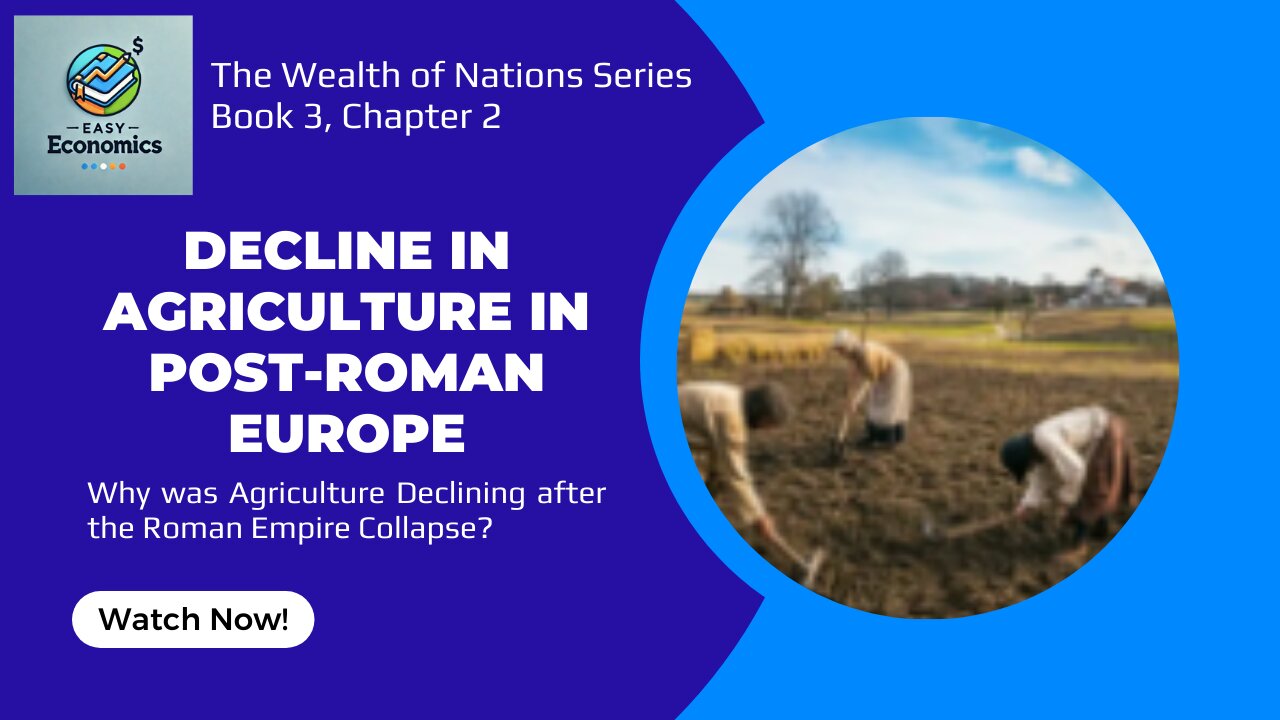
The Wealth of Nations Book 5 Chapter 1 - Public Debt
The Wealth of Nations Book 5 Chapter 2 Part 2 Article 4 - Taxes on Consumable Goods
The Wealth of Nations Book 5 Chapter 2 Part 2 Article 3 - Taxes on Wages
The Wealth of Nations Book Chapter 2 Appendix Article 1 & 2 - Taxes on Property Transfers
The Wealth of Nations Book 5 Chapter 2 Part 2 Article 2 - Taxes on Profits of Stock
The Wealth of Nations Book 5 Chapter 2 Part 2 Article 1 - Taxes on the Rent of Land
The Wealth of Nations Book 5 Chapter 2 Part 1 - Exploring Public Revenue Sources
The Wealth of Nations Book 5 Chapter 1 Part 4 - Who Should Pay for Public Cost?
The Wealth of Nations Book 5 Chapter 1 Part 3 Article 3 - The Cost of Religious Influence
The Wealth of Nations Book 5 Chapter 1 Part 3 Article 2 - The Real Cost of Education
The Wealth of Nations Book 5 Chapter 1 Part 3 Article 1 - The Expense of Public Works
The Wealth of Nations Book 5 Chapter 1 Part 2 - The Cost of Justice
The Wealth of Nations Book 5 Chapter 1 Part 1 - The Cost of National Defence
The Wealth of Nations Book 4 Chapter 9 - Systems in Political Economy
The Wealth of Nations Book 4 Chapter 8 - The Mercantile System's Hidden Flaws
The Wealth of Nations Book 4 Chapter 7 Part 3 - How Europe Benefits from American Colonies
The Wealth of Nations Book 4 Chapter 7 Part 2 - Why New Colonies Prosper
The Wealth of Nations Book 4 Chapter 7 Part 1 - The Motives for Establishing New Colonies
The Wealth of Nations Book 4 Chapter 6 - The Hidden Cost of Trade Treaties
The Wealth of Nations Book 4 Chapter 5 - Bounties, The Hidden Cost of Subsidies
The Wealth of Nations Book 4 Chapter 4 - Understanding Drawbacks in International Trade
The Wealth of Nations Book 4 Chapter 3 Part 2 - Why Extraordinary Restrictions Don't Make Sense
The Wealth of Nations Book 4 Chapter 3 Part 1 - The Unreasonableness of Import Restrictions
The Wealth of Nations Book 4 Chapter 2 - Restrictions on Goods that can be Produced at Home
The Wealth of Nations Book 4 Chapter 1 - The Principle of Commerce and Mercantile Systems
The Wealth of Nations Book 3 Chapter 4 - How Commerce in Towns Improved the Country
The Wealth of Nations Book 3 Chapter 3 - The Rise of Cities After Rome's Fall
The Wealth of Nations Book 3 Chapter 2 - The Decline of Agriculture in Post-Roman Europe
The Wealth of Nations Book 3 Chapter 1 - The Natural Progress of Wealth Explained
The Wealth of Nations Book 2 Chapter 5 - The Different Uses of Capital
The Wealth of Nations Book 2 Chapter 4 - Understanding Stock Lend at Interest
The Wealth of Nations Book 2 Chapter 3 - Understanding Productive and Unproductive Labour
The Wealth of Nations Book 2 Chapter 2 - Money as Part of Society's Wealth
The Wealth of Nations Book 2 Chapter 1 - The Division of Stock
The Wealth of Nations - Introduction Book 2 - Nature Accumulation and Use of Stock
The Wealth of Nations - Conclusion of Book 1
The Wealth of Nations Book 1 Chapter 11 part 3e - Effect of Improvement on the Price of Manufactures
The Wealth of Nations Book1 Chapter 11 Part 3d - Conclusion on the Value of Silver
The Wealth of Nations Book 1 Chapter 11 Part 3c - Different Effects on Improvement of Three Goods
The Wealth of Nations Book 1 Chapter 11 Part 3b - Variations in the Value of Gold and Silver
The Wealth of Nations Book 1 Chapter 11 Part 3a - The Change Between Value of the Produce and Silver
The Wealth of Nations Book 1 Chapter 11 Part 2 - Of The Produce of Land
The Wealth of Nations Book 1 Chapter 11 Part 1 - Of the Rent of Land
The Wealth of Nations Book 1 Chapter 10 Part 2 - Inequality Created by Europe's Policies
The Wealth of Nations Chapter 10 Book 1 Part 1 - Wages and Profits in Different Jobs
The Wealth of Nations Chapter 9 book 1 - Of the Profits of Stock
The Wealth of Nations Chapter 8 Book 1 - The Wages of Labor
The Wealth of Nations Chapter 7 Book 1 - Understanding Natural Prices and Market Prices
The Wealth of Nations Chapter 6 Book 1 - Components of the Price of Commodities
The Wealth of Nations Chapter 5 Book 1 - Understanding Real VS Nominal Prices
The Wealth of Nations Chapter 4 Book 1 - The Origin and the Use of Money
The Wealth of Nations Chapter 3 Book 1 - The Division of Labor, Market Size Matters
The Wealth of Nations Chapter 2 Book 1 - The Principle Which Gives Occasion to the Division of Labor
The Wealth of Nations Chapter 1 Book 1 - The Power of Division of Labor
The Wealth of Nations - Introduction and Overview
Adam Smith - The Philosopher Who Changed How We See The World
The Wealth of Nations - A Timeless Guide to Prosperity
The Wealth of Nations Book 3 Chapter 2 - The Decline of Agriculture in Post-Roman Europe
Are you interested to read the original book? Get ‘The Wealth of Nations’ by Adam Smith now: https://amzn.to/3W5xeku
After the fall of the Roman Empire, agriculture in Europe faced a significant decline. The collapse of trade between towns and the countryside, coupled with the concentration of land in the hands of a few wealthy landowners, led to stagnation in farming. The primogeniture law and entails, which kept estates intact and prevented land from being divided or sold, prevented agricultural progress. Landlords focused on luxury rather than improving their estates, while tenants—often slaves or peasants—had little incentive to enhance the land they worked. Over time, systems like the metayer system emerged, allowing tenants to work land for a share of the produce, but they still faced obstacles. In contrast, regions like England introduced legal reforms that improved tenant security and incentivized land improvements, contributing to greater prosperity. This chapter explores the challenges faced by agriculture in post-Roman Europe and how legal and social structures shaped its evolution.
00:00 - The Decline of Agriculture in Post-Roman Europe
00:13 - Post-Roman Chaos
00:52 - Land Ownership and Laws
02:18 - Land Management and Improvement
02:57 - Tenant Systems and Labor
03:51 - Abolition of Servitude and Rise of Metayer System
04:49 - Legal Reforms and Tenant Security
05:38 - Tenant Rights in Scotland and Europe
06:34 - Service Obligations and Public Duties
07:10 - Taxation and Its Effects
07:39 - Social Status of Farmers
08:13 - Ancient Policies and Trade Restrictions
08:53 - Conclusion
-
 16:49
16:49
Eat Sleep Cruise
7 days agoOur HONEST Celebration Key Review - Carnival's New Private Island in The Bahamas
1.14K -
 8:41
8:41
nospeedlimitgermany
5 days ago $0.19 earnedBMW 316i E36 Compact 102 PS Top Speed Drive German Autobahn No Speed Limit POV
1.07K -
 25:38
25:38
Clownfish TV
15 hours agoAmerican Eagle Sydney Sweeney Situation is INSANE...
4.32K10 -
 2:46
2:46
Blackstone Griddles
14 hours agoBetty's Breakfast Tacos on the Blackstone Griddle
3.07K3 -
 2:23
2:23
The Quiet Part
16 hours agoCanada is no longer requiring immigrants to speak English?!
1.55K5 -
 13:03
13:03
Dr Disrespect
3 days agoDr Disrespect’s BIGGEST Announcement Yet
106K43 -
 21:08
21:08
GritsGG
14 hours agoRank 1 POV - Spectating Solos!
8.34K -
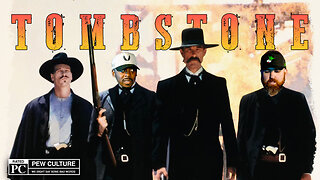 40:23
40:23
pewculture
1 day ago $5.52 earnedThis is the best western movie ever made! EP#25
15.8K6 -
 44:43
44:43
Omar Elattar
8 months agoAmerican Idol Finalist: “I Had No Plan B! - It Was Idol Or Nothing”
6.59K3 -
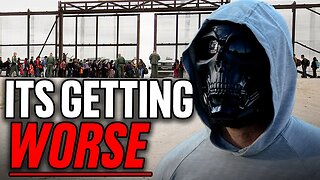 58:56
58:56
The Connect: With Johnny Mitchell
1 day ago $30.77 earnedA Migrant Smuggler Reveals How Cartel Trafficking Works, WARNS Of Conditions At The Border
106K52
